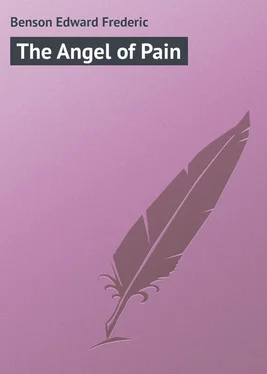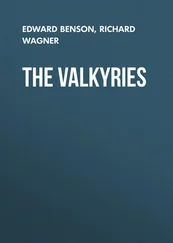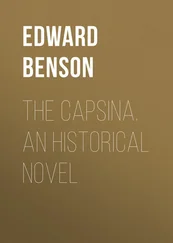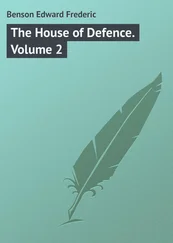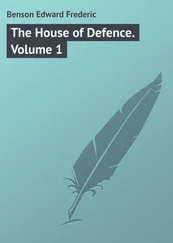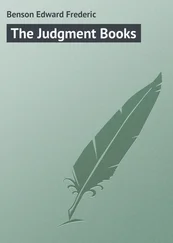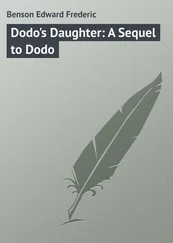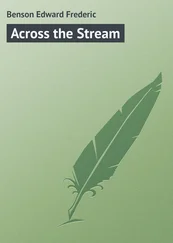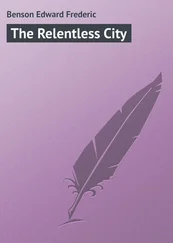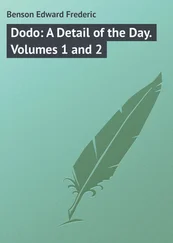Edward Benson - The Angel of Pain
Здесь есть возможность читать онлайн «Edward Benson - The Angel of Pain» — ознакомительный отрывок электронной книги совершенно бесплатно, а после прочтения отрывка купить полную версию. В некоторых случаях можно слушать аудио, скачать через торрент в формате fb2 и присутствует краткое содержание. Жанр: foreign_prose, на английском языке. Описание произведения, (предисловие) а так же отзывы посетителей доступны на портале библиотеки ЛибКат.
- Название:The Angel of Pain
- Автор:
- Жанр:
- Год:неизвестен
- ISBN:нет данных
- Рейтинг книги:5 / 5. Голосов: 1
-
Избранное:Добавить в избранное
- Отзывы:
-
Ваша оценка:
- 100
- 1
- 2
- 3
- 4
- 5
The Angel of Pain: краткое содержание, описание и аннотация
Предлагаем к чтению аннотацию, описание, краткое содержание или предисловие (зависит от того, что написал сам автор книги «The Angel of Pain»). Если вы не нашли необходимую информацию о книге — напишите в комментариях, мы постараемся отыскать её.
The Angel of Pain — читать онлайн ознакомительный отрывок
Ниже представлен текст книги, разбитый по страницам. Система сохранения места последней прочитанной страницы, позволяет с удобством читать онлайн бесплатно книгу «The Angel of Pain», без необходимости каждый раз заново искать на чём Вы остановились. Поставьте закладку, и сможете в любой момент перейти на страницу, на которой закончили чтение.
Интервал:
Закладка:
“Ah, yes,” he was saying, “an artist’s business is not to put things down as they are, but to put them down as they strike him. Actual truth has nothing to do with the value of a landscape. The point is that the picture should be beautiful. And the same with portraits, only beauty there is unnecessary. You have to put down what you think you see, or what you choose to see.”
“That shouldn’t lead to egoism,” remarked Tom. “It should lead you to the study of other people.”
Evelyn shook his head.
“No, no,” he said, “it leads you to devote yourself entirely almost to the cultivation of your own faculty of seeing. All fine portraits show a great deal of the artist, and perhaps comparatively little of the sitter. Why are Rembrandts so unmistakable? Not because the type of his sitters themselves was almost identical, but because there is lots of Rembrandt in each. You can’t have style unless you are egoistic. In fact, for an artist style means egoism. I have heaps. I don’t say or pretend it’s good, but there it is. Take it or leave it.”
Tom Merivale laughed.
“You are perfectly inimitable,” he said. “I love your serious, vivid nonsense. That you are an egoist is quite, quite true. But how much better an artist you would be if you weren’t. What you want is deepening. You don’t like the deeps, you know. You haven’t got any. You don’t like what you don’t understand; that very simple little affair last night, for instance, frightened you.”
Egoists are invariably truthful – according to their lights – about themselves. Evelyn was truthful now.
“Yes, that is so,” he said. “I don’t pretend to wish to seek out the secrets of the stars. But I know what I like. And I don’t like anything that leads into the heart of things. I don’t like interiors and symbolism. There is quite enough symbol for me on the surface. What I mean is that the eyebrow itself, the curve of the mouth, will tell you quite as much as one has any use for about the brain that makes the eyebrow frown or the mouth smile. Beauty may be skin deep only, but it is quite deep enough. Skin deep! Why, it is as deep as the sea!”
Tom Merivale was silent a little.
“Do you know, you are an interesting survival of the Pagan spirit?” he said at length.
Evelyn laughed.
“Erect me an altar then at once, and crown me with roses,” he remarked. “But what have I said just now that makes you think that?”
“Nothing particular this moment,” he answered, “though your remarking that beauty was enough for you is thoroughly Greek in its way. No; what struck me was that never have I seen in you the smallest rudiment or embryo of a conscience or of any moral sense.”
Evelyn looked up with real interest at this criticism.
“Oh, that is perfectly true,” he said. “Certainly I never have remorse; it must be awful, a sort of moral toothache. All the same, I don’t steal or lie, you know.”
“Merely because lying and stealing are very inartistic performances,” said Tom. “But no idea of morality stands in your way.”
Evelyn got up, looking out over the heat-hazed green of the woods below them with his brilliant glance.
“Is that very shocking?” he asked, with perfectly unassumed naïvetê .
“I suppose it is. Personally, I am never shocked at anything. But it seems to me very dangerous. You ought to wear a semaphore with a red lamp burning at the end of it.”
Evelyn half shut his eyes and put his head on one side.
“I don’t think that would compose well,” he said.
“That is most consistently spoken,” said Tom. “But really, if you are ever in earnest about anything beside your art, you would be a public danger.”
Evelyn turned round on this.
“You call me a Pagan,” he said. “Well, what are you, pray, with your communings with nature and conjuring tricks with nightingales? You belong to quite as early a form of man.”
“I know. I am primeval. At least I hope to be before I die.”
“What’s the object?”
“In order to see Pan. I am getting on. Come down to the New Forest sometime, and you shall see very odd things, I promise you. Really, Evelyn, I wish you would come. It would do you no end of good.”
He got up, and taking the arm of the other man, walked with him down the terrace.
“You are brilliant, I grant you,” he said; “but you are like a mirror, only reflecting things. What you want is to be lit from within. Who is it who talks of the royalty of inward happiness? That is such a true phrase. All happiness from without is not happiness at all; it is only pleasure. And pleasure is always imperfect. It flickers and goes out, it has scratching nails – ”
Evelyn shook himself free.
“Ah, let me be,” he said. “I don’t want anything else. Besides, as you have told me before, you yourself dislike and detest suffering or pain. But how can you hope to understand Nature at all if you leave all that aside? Why, man, the whole of Nature is one groan, one continuous preying of creature on creature. In your life in the New Forest you leave all that out.”
Tom Merivale paused.
“I know I do,” he said, “because I want to grasp first, once and for all the huge joy that pervades Nature, which seems to me much more vital in itself than pain. It seems to me that pain may be much more rightly called absence of joy than joy be called absence of pain. What the whole thing starts from, the essential spring of the world is not pain and death, but joy and life.”
“Ah, there I am with you. But there is so much joy and life on the surface of things that I don’t wish to probe down. Ah, Tom, a day like this now; woven webs of blue heat, hot scents from the flower beds, the faces of our friends. Is that not enough? It is for me. And, talking of faces, Miss Ellington has the most perfectly modelled face I ever saw. The more I look at it, the more it amazes me. I stared at her all breakfast. And the charm of it is its consistent irregularity; not a feature is anything like perfect, but what a whole! I wish I could do her portrait.”
Tom laughed.
“There would not be the slightest difficulty about that, I should say,” he remarked, “if you promise to present it to her mother.”
“Why, of course, I would. How funny it must feel to be hard like that. She is very bruising; I feel that I am being hit in the eye when she talks to me. And she knows how many shillings go to a sovereign.”
“Twenty,” remarked Tom.
“Ah, that is where you are wrong. She gets twenty-one for each of her sovereigns. And thirteen pence for each of her shillings, and the portrait of her daughter for nothing at all. Oh, Tom, think of it – with a background of something blue, cornflower, forget-me-nots, or lilac, to show how really golden her hair is. There’s Mrs. Home.”
Evelyn whistled with peculiar shrillness on his fingers to the neat little figure on the croquet lawn below them. She started, not violently, for nothing she did was violent, but very completely.
“Ah, it is only you,” she said. “I thought it might be an express train loose. Are you not going on the river, dear Evelyn?”
“I was prevented,” he said, jumping down the steps in one flying leap. “Dear Philippina – ”
“What next? What next?” murmured Mrs. Home. “Oh, do behave, Evelyn.”
“Well, Philip is your son, so you are Philippina. But why have prize-fighters in your house?”
“Prize-fighters?”
“Yes. Lady Ellington had my head in Chancery for ten minutes just now. She delivered a series of quick-firing questions. I know why, too; it was to prevent my going on the river. She was perfectly successful – I should think she always was successful; she mowed me down. Now will you tell me the truth or not?”
Читать дальшеИнтервал:
Закладка:
Похожие книги на «The Angel of Pain»
Представляем Вашему вниманию похожие книги на «The Angel of Pain» списком для выбора. Мы отобрали схожую по названию и смыслу литературу в надежде предоставить читателям больше вариантов отыскать новые, интересные, ещё непрочитанные произведения.
Обсуждение, отзывы о книге «The Angel of Pain» и просто собственные мнения читателей. Оставьте ваши комментарии, напишите, что Вы думаете о произведении, его смысле или главных героях. Укажите что конкретно понравилось, а что нет, и почему Вы так считаете.
